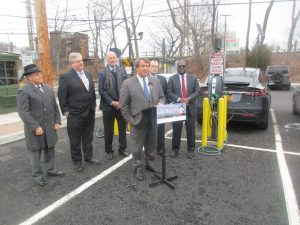Latimer Proposes Expansion of Electric Vehicle Charging Stations

New legislation to increase the number of electric vehicle charging stations throughout Westchester has been introduced to the Board of Legislators, a move designed to encourage more people to consider driving electric and hybrid cars.
County Executive George Latimer touted the measure Wednesday that he recently sent to lawmakers that calls for more stations in county-owned lots as well as in facilities built through a county tax incentive program such as the IDA.
Under the plan, county parking garages and open parking lots that have 250 spaces or less would have 10 percent of the spots equipped with Level 1 charging stations and another 10 percent of the spaces outfitted with Level 2 electric chargers.
In parking facilities with more than 250 spaces, there would be 25 Level 1 and Level 2 chargers, which would support 50 spaces each.
Latimer said the move was to start building the infrastructure that would make it easier and more attractive for residents to buy the increasingly popular electric and hybrid vehicles to protect the environment.
“It means having the infrastructure that we need to have so that a person that has one of these vehicles, that when they’re parking at a facility owned by Westchester County they’ll know there will be charging stations there,” Latimer said at the county-owned parking lot at the North White Plains Metro-North station, which recently had 10 Level 2 charging stations installed.
The bill was sent to the Board of Legislators on Jan. 21 and was referred to several different committees, said County Legislator Vedat Gashi (D-Yorktown), who was one of a group of county officials who gathered to advertise the plan. Gashi said he expects the issue to be addressed quickly since it’s something that most of the legislators agree should be done.
The announcement comes a week after Latimer heralded the county’s food scrap recycling program to have Westchester do its part to address the climate crisis. Transportation contributes as much as one-third of all greenhouse has emissions, said Peter McCartt, the county’s director of Energy Conservation & Sustainability.
“This is an exciting time, there’s a lot to be done and fortunately we have County Executive Latimer here,” McCartt said. “He has the political will to do it and he’s getting it done.”
Among the locations that have been targeted for the chargers should the legislation be approved are the lots at the County Center, Maplewood, Hudson Hills, Dunwoodie and Mohansic golf courses as well as Saxon Woods Pool, Latimer said.
In addition, any Level 2 chargers installed would have the capacity to be upgraded to Level 3. Bud Nicoletti, the county’s deputy of Public Works and Transportation, said the difference between Level 1 and Level 2 chargers is power. Level 2 chargers have about two-and-a-half times the number of kilowatts, which would roughly equate to the amount of time a car would need to be fully charged, he said. The amount of time to fully charge a car varies depending on the make and model.
Nicoletti said the Level 2 chargers cost about $4,000 each, which includes installation. Westchester received a $40,000 grant from NYSERDA for the 10 chargers at its North White Plains train station lot.
Under the proposed legislation, Level 1 chargers could be considered a 120-volt outlet that is accessible to a parking space, said Deputy County Executive Ken Jenkins.
Latimer’s announcement of the vehicle charging stations comes a day after the county learned that it will receive $3 million in state funds to help the county convert its entire Beeline bus fleet to hybrids by 2025. With a partial fleet of hybrids, the county saved just over $1 million in diesel fuel in 2019.
“To deal with the climate crisis is going to take thousands of decisions and these decisions aren’t going to be made by the county government alone but in general,” Latimer said. “It’s going to be made by individuals. Each of us has to look at how we live our lives, what our lifestyles are and understand there are adjustments to be made.”

Martin has more than 30 years experience covering local news in Westchester and Putnam counties, including a frequent focus on zoning and planning issues. He has been editor-in-chief of The Examiner since its inception in 2007. Read more from Martin’s editor-author bio here. Read Martin’s archived work here: https://www.theexaminernews.com/author/martin-wilbur2007/
